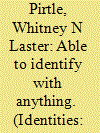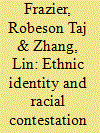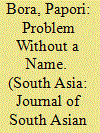| Srl | Item |
| 1 |
ID:
190923


|
|
|
|
|
| Summary/Abstract |
The Apartheid South African state crafted Coloured racial identities through a powerful racial project that signified and positioned them as a group that was both neither and between White and Black. Non-Racialism in post-Apartheid South Africa has, however, loosened the role of the state in making race. So how has the transition of the state impacted ‘Coloured’ racial identities today? Informed by both macro-level theories of racial formation and micro-level theories of racial identities, I examine racial identity choices as constrained by the state among 50 adults. I find identities choices are influenced by transformations in the racial state: racialisation via reappropriating ‘Coloured’; re-formation and joining of ‘Black’; racial uplift construction as ‘Khoisan’; and a non-racialist approach to identity as ‘Human’. I argue transformations of the racial state shape, or even lead to, a transition in racial identities and therefore clarify theorises of co-constructed racial identity formations.
|
|
|
|
|
|
|
|
|
|
|
|
|
|
|
|
| 2 |
ID:
133732


|
|
|
|
|
| Publication |
2014.
|
| Summary/Abstract |
This article examines Chinese cyberspace debates over the racial and national identity of a television show contestant Lou Jing, a biracial woman of Chinese and African American descent. We argue that the online commentary about her offers a productive entry point into contemporary Chinese cultural struggles over race. In particular, we consider how the Internet and other digital communication technologies are being mobilized as discursive sites for articulations of Chinese anti-black racism, as well as discursive sites of contestation, knowledge production, and cultural exchange regarding Chinese constructions of race and nationality.
|
|
|
|
|
|
|
|
|
|
|
|
|
|
|
|
| 3 |
ID:
168818


|
|
|
|
|
| Summary/Abstract |
This paper is about race and race relations in India with a focus on the experiences of violence and discrimination that people from India’s Northeast face in mainland India. This has become a ‘problem without a name’, generally articulated as a problem of cultural difference. The paper argues that the emphasis on cultural difference elides the issue of racism faced by India’s north-eastern subjects, whereby culture is a mere substitute for race. Institutional approaches to racism tend to rely on a biological understanding of race. The paper demonstrates the racial formation of the category ‘north-eastern’ through the processes of colonialism, nationalism and counter-insurgency. This approach shows the ways in which racism, classism and sexism work together in constituting the racialised, gendered and classed north-eastern subject.
|
|
|
|
|
|
|
|
|
|
|
|
|
|
|
|
| 4 |
ID:
131526


|
|
|
|
|
| Publication |
2014.
|
| Summary/Abstract |
I examine the role of US land policy in strategically controlling and moving populations around the continent with the goal of expanding borders and securing and incorporating new territory on the frontier. The government effectively used land policies and population control to enable an otherwise constrained American state to assert authority over the direction of expansion, to engineer settlement patterns in a manner to secure the territory without a large military, and to maintain an official fidelity to constitutional principles while engineering a dominant racial vision. I examine both the success and failures of these policies over the nineteenth century, with material drawn from government documents and primary sources. I discuss the consequences of this land policy for how we understand the American state in the context of comparative state and racial formation.
|
|
|
|
|
|
|
|
|
|
|
|
|
|
|
|